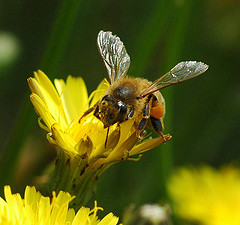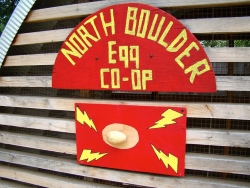Thanks to all of you who sent in your thoughtful suggestions about what should be on this list of “Good Neighbor Tips” for folks who will be selling fresh produce and cottage foods from their homes, under a proposed Cottage Foods for Boulder Pilot Project. I have tried to balance the many (sometimes conflicting) opinions that were sent in with regulations that are already in the Boulder Revised Code. This “Tips” list will be given to people who are applying for a Home Occupation license to sell Cottage Foods and Fresh Produce.
Is there anything that you think needs to be added to this list? Anything you have a particular beef with? Let me know. Email me at Elizabeth@ElizabethBlackArt.com. Thanks for all your help with this.
Parking and Traffic
The vast majority of neighborhood complaints are caused by parking and traffic. Recognizing that you have little control over your patrons’ driving and parking habits, here are some things that may help:
- If possible, provide a safe parking space for patrons stopping to pick up product.
- Consider putting a “KidAlert” sign out on the days you are selling product. $28 from Target.
- Ask your patrons to drive slowly and to not turn around in neighboring driveways.
- Offer to repair any damage your patrons may cause to your neighbor’s frontage with their creative parking maneuvers.

Communication and Goodwill
- Get to know all your neighbors and exchange emails and phone numbers so lines of communication are easy and open. Consider setting up a neighborhood email tree. Inform them about your business, hours, season, and special events. Tell them to inform you about any problem, so that you can fix it immediately.
- Consider an annual Christmas gift of product to your neighbors, or a Welcome-to-the-Neighborhood gift.
- Offer a significant “Good-Neighbor Discount” on product to neighboring properties.
- If you have the means, ability and inclination, consider hosting an annual neighborhood party.
Environmental Issues
- Don’t run noisy machinery before 7AM or after 9PM. 8AM and 8PM are better start and end times.
- Minimize odors wafting to adjacent properties.
- Consider bear-proofing your site so bears won’t come back for a second visit. Compost piles, fruit trees, hives and chicken coops all attract bears. Electric fences, “unwelcome mats,” and radios tuned to talk shows are all effective deterrents. More information is available from Colorado Parks and Wildlife.
Gardens
- Familiarize yourself with Boulder’s very specific pesticide rules. If you are applying pesticides (including organics) to an area greater than 100 square feet, you need to notify your neighbors.
- Be thoughtful of your neighbors when locating your compost pile. Manage it so as to minimize odors.
- Ways to minimize odors from manure include using aged manure rather than fresh, applying manure only in winter, or tilling manure in promptly.
- Wrangle your water resources responsibly to prevent run-off to neighboring properties.
Bees
- Be thoughtful of your neighbors when locating your hives. Consider their outdoor activities so as to avoid disruption.
- Provide a water source for your bees. Change the water every 48 hours to kill mosquito larva.
- Have a plan and equipment ready to promptly hive any swarms that your hives may throw.
- Manage your bees so as to encourage a docile nature, re-queening as needed.
Chickens
- Crowing roosters violate Boulder’s noise ordinances. Consider a NO ROOSTERS policy.
- Store feed in rodent-proof containers. Consider a rodent-control program such as a cat, D-con, or traps.
- Clean your chicken coop frequently, with an added annual “deep cleaning.” Dispose of dead animals pronto.
- Be thoughtful of your neighbors when locating your chicken coop. Consider screening your coop from close neighbors.
- Careful coop construction and a coat of paint can help eliminate aesthetic complaints about your chickens.
- Good fences make good neighbors: sturdy welded wire (NOT chicken wire) with small holes, buried into the ground, keeps your critters from escaping into your neighbor’s yard, and keeps predators out.
- Consider teaching neighborhood kids about your chickens and inviting kids to bring treats for them.
- Have a clear plan for sick or aged hens that no longer lay. It is legal to slaughter your own chickens, but some folks may passionately object and report you for animal cruelty. Be discrete and humane.





